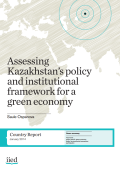
Kazakhstan has taken a lead among Central Asian countries in mapping a path towards a green economy. While environmental degradation has often been discussed, only recently have environmental concerns begun to be addressed within the mainstream economy. In 2011 the Kazakhstan government asked IIED to help define its approach to ‘greening’ the economy. Focused initially on the Green Bridge Partnership Programme of investments, in a positive step the Kazakhstan government adopted its own Green Economy Concept, which provides the overall policy context. This report analyses progress to date and makes ten recommendations on the enabling conditions needed for Kazakhstan to achieve a substantial transition to a green economy.
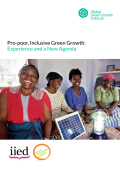
Green growth initiatives to date have often placed the economy and environment front and centre. However, for green growth to fulfil its promise, it needs to also focus on people and address systemic causes of poverty and social exclusion.
Green growth that does not deliver benefits to all stakeholders will not lead to the kind of transformative change envisioned by the global community and outlined in the Sustainable Development Goals.
The ‘Pro poor, inclusive green growth’ report demonstrates how green growth can address some of the drivers of poverty and social exclusion.
Published by the Global Green Growth Institute (GGGI) in association with the International Institute for Environment and Development (IIED) and the Green Economy Coalition (GEC), the report stresses that to be effective green growth strategies will need to strengthen institutional and governance structures and respond to people’s needs.
Drawing from a number of case studies the publication provides practical steps for policymakers, business and civil society to work together to deliver inclusive green growth.
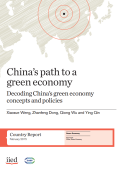
China’s transition to a green economy has immense implications for sustainable development both domestically and worldwide. Yet China’s green economy policies, concepts and actors still remain poorly understood in the emerging international discourse on the green economy.
This report serves as an introductory guide to China’s green economy thinking by i) tracing the evolution of China’s green economy thinking of the last 40 years, ii) mapping key macro policies that shape China’s green economy prospects today, iii) identifying relevant sectoral policies and players in finance, environmental industry, energy, forestry, urbanisation and industrial production, and iv) examining stakeholder groups, unique traits and areas for further exploration.
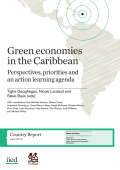
Growing financial, climate and social challenges in the Caribbean have sparked the search for new economic pathways that would better serve the region.
This paper summarises early explorations by the Green Economy Action Learning Group (GE ALG), an independent and Caribbean-driven initiative which aims to help governments and other stakeholders develop a practical Caribbean vision of an inclusive and resilient ‘green’ economy. It pulls together background papers from ALG members, revealing diverse regional, national, local and sector perspectives on green economy progress, needs and prospects.
An ‘action learning’ agenda is proposed as a way to evolve green economy pathways in three areas: SMMEs; ‘triple bottom line’ reporting across public and private sectors; and multi-stakeholder mechanisms for developing green economy policy.
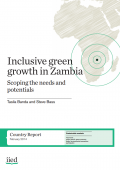
Many countries are exploring their prospects for green growth. It has become a hot topic, proving attractive to governments, companies, and civil society groups alike. The 2012 Rio+20 Summit concluded that green growth is best defined and tailored according to the individual country context. This report describes Zambia’s approach to develop a Zambian Inclusive Green Growth Strategy under its Sixth National Development Plan.
The Zambian definition for inclusive green growth, is ‘inclusive development that makes sustainable and equitable use of Zambia’s natural resources within ecological limits’. The report describes the changing international policy and financial context for inclusive green growth, reports on a workshop facilitated by IIED, and proposes initial steps to develop its operational Strategy.
